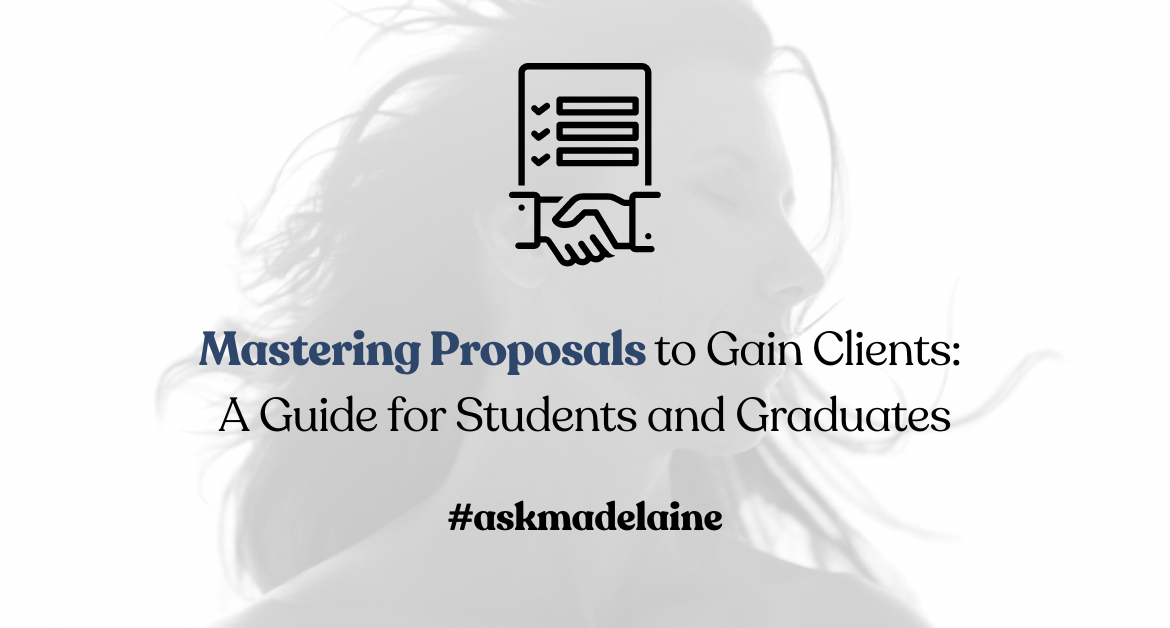

Mastering Proposals to Gain Clients: A Guide for Students and Graduates
Are you a student or recent graduate eager to turn your proposals into successful client opportunities? Crafting a compelling proposal isn’t just about putting words on paper—it’s about standing out, understanding client needs, and positioning yourself effectively. Having encountered numerous poorly crafted proposals while seeking clients in practice or looking for case study opportunities, I understand the critical importance of mastering this skill early in your career.
Understanding the Impact of Your Proposal
In my experience, the quality of your proposal can significantly influence your ability to secure clients or opportunities for case studies. A poorly structured or unclear proposal can leave potential clients questioning your professionalism and expertise. Conversely, a well-crafted proposal not only showcases your capabilities but also instils confidence in your ability to deliver results.
Why Crafting a Compelling Proposal Matters
The ability to craft a compelling proposal directly correlates with your success in building a thriving practice or securing valuable opportunities. It’s not just about showcasing your skills; it’s about persuading clients to choose you over competitors. This skill is foundational to establishing yourself in your field and attracting clients who value what you have to offer.
Identifying Your Unique Value Proposition
Before you start drafting your proposal, take a moment to reflect on what sets you apart:
1. Define Your Offering
When defining what you’re offering, consider these aspects:
Services or Solutions: Clearly outline the specific services or solutions you provide. What are the main benefits clients will receive?
Target Audience: Identify your ideal client or target audience. What are their needs, challenges, and expectations?
Key Benefits: Highlight the primary benefits or outcomes clients can expect by choosing your services. Focus on how you solve their problems or meet their needs uniquely.
Tailoring your offering to address specific client needs demonstrates your understanding and ability to provide value.
2. Articulate Your Value
Once you’ve defined your offering, articulate your value proposition effectively:
Client Benefits: Clearly explain how your skills, expertise, or services will benefit clients. What tangible results can they expect?
Unique Insights: Share any unique insights, approaches, or methodologies you bring to the table. Provide examples of how your approach has led to successful outcomes.
Differentiation: Differentiate yourself from competitors by highlighting what makes you unique. Why should clients choose you over others offering similar services?
Your value proposition should be compelling, concise, and focused on demonstrating why you’re the best choice for potential clients.
3. Create a Sense of Urgency
Incorporating elements of urgency can encourage potential clients to act promptly:
Limited Availability: Highlight any scarcity or limited availability of your services. Emphasise the exclusivity of your offer to create a sense of urgency.
Deadline Awareness: If applicable, communicate any deadlines or time-sensitive aspects of your proposal. Encourage clients to take action before time runs out.
Additional Incentives: Offer incentives such as bonuses, discounts, or special packages to motivate clients to make a decision quickly. Clearly outline the added value they will receive by acting now.
Creating a sense of urgency can help move potential clients from consideration to action more swiftly.
4. Outline Clear Client Expectations
To ensure a successful collaboration, clearly outline what you expect from clients:
Availability and Commitment: Define the level of commitment and availability you require from clients. Specify expectations for meetings, sessions, or communication.
Feedback and Communication: Establish clear guidelines for communication and feedback throughout the project. How often will you touch base? What format do you prefer for feedback?
Adherence to Timelines: Set clear expectations for project timelines and deadlines. Ensure clients understand the importance of meeting agreed-upon milestones and deliverables.
By outlining clear expectations, you demonstrate professionalism and set the foundation for a productive client relationship.
Example Proposal for Seeking Case Studies
Now that we’ve explored how to craft a powerful proposal, let’s apply this knowledge with a practical example of what it may look like for someone seeking case study participants:
🌟 Seeking Participants for Case Studies! 🌟
Hey there! 👋 Are you interested in being part of an exciting case study opportunity? I’m [Your Name], a [Your Program/Major] student at [Your University], and I’m looking for 1-2 individuals eager to dive into [Briefly mention the topic or focus area of your studies, e.g., holistic counselling, marketing strategies, software development].
📚 What’s in it for you?
🌿 Free [Number] sessions of personalised [Service or Study Focus].
🎓 Hands-on guidance from a dedicated student committed to delivering top-notch results.
🚀 The chance to contribute to cutting-edge research in [Your Field/Area of Study].
⏳ Act Fast!
I have limited spots available, so if you’re keen to join, don’t wait! Reach out soon to secure your place.
🔍 Requirements:
To make the most of this opportunity, participants should:
💬 Commit to attending all scheduled sessions.
📝 Provide honest feedback throughout the study.
🤝 Be open to exploring new ideas and approaches.
💬 Interested? Drop me a message or comment below! Let’s chat about how we can work together to make this case study a success.
Looking forward to connecting with you!
(Your Name)
Elevate Your Proposals, Elevate Your Success
Crafting compelling proposals isn’t just about showcasing your skills; it’s about demonstrating your value and persuading clients to choose you. By defining your unique offering, articulating your value proposition clearly, creating urgency, and outlining clear expectations, you set yourself apart as a professional who delivers results.
As you embark on your journey to attract clients and opportunities, remember to continuously refine your proposal-writing skills. Reflect on what makes you unique, hone your ability to communicate effectively, and adapt your approach based on feedback and results. With each proposal, you’re not only presenting a service but also forging a path towards building a successful career.
Start applying these strategies today and observe how your proposals evolve into powerful tools for business growth and client acquisition.
I Frid, Madelaine
PLUS – Whenever you’re ready, there are 2 ways we can work together:
- Sign up for one of our current courses at ASHC and get taught by my team of advisors and me. All our courses are internationally and nationally industry-approved and will equip you with all the tools to open up your own professional private practice.
- Apply for one of only three spots as my private client. Mentorship for Holistic Mental Health Practitioners (1), Mentorship for High Performers (2).





Leave a Reply